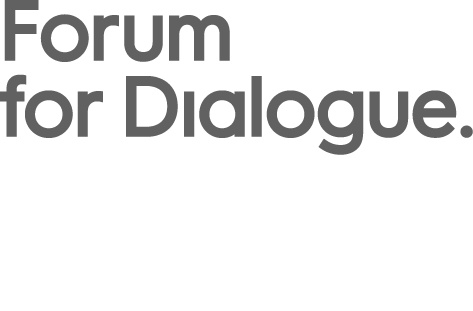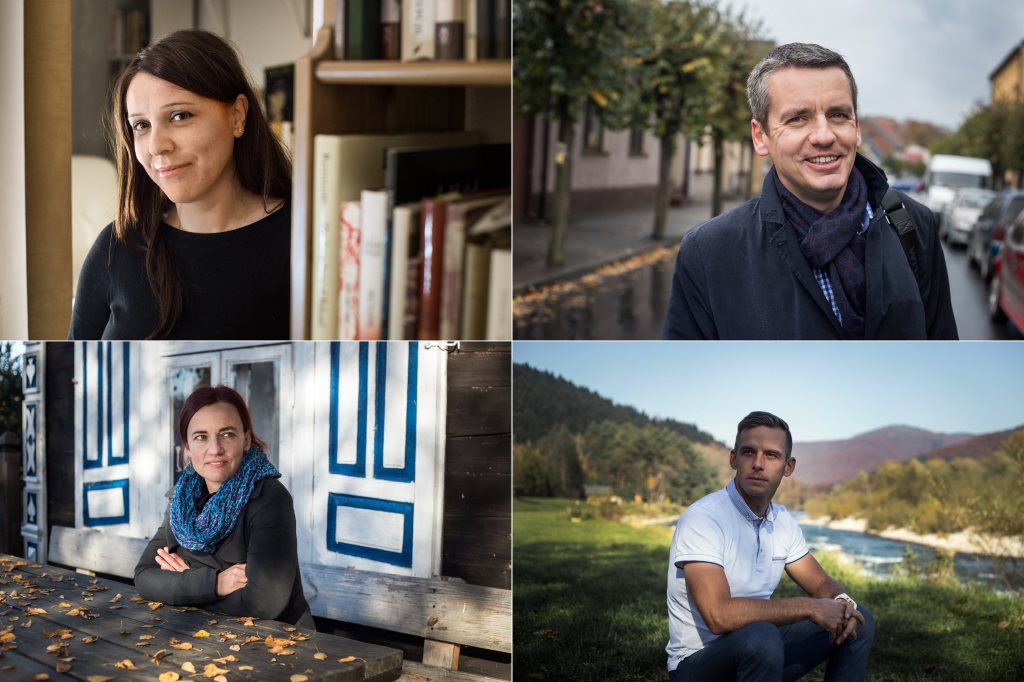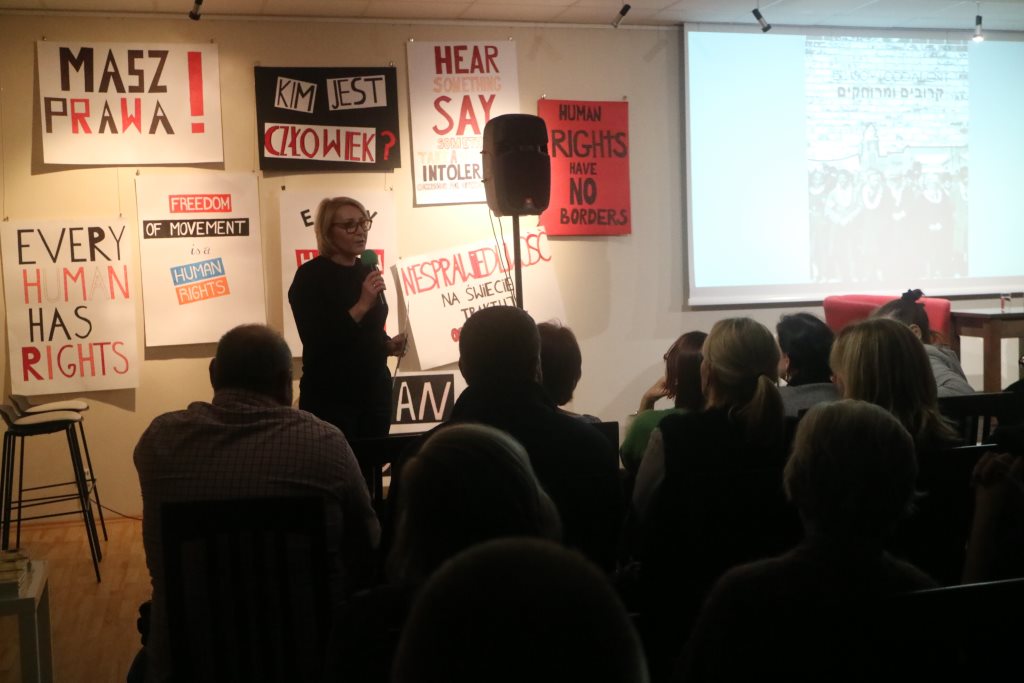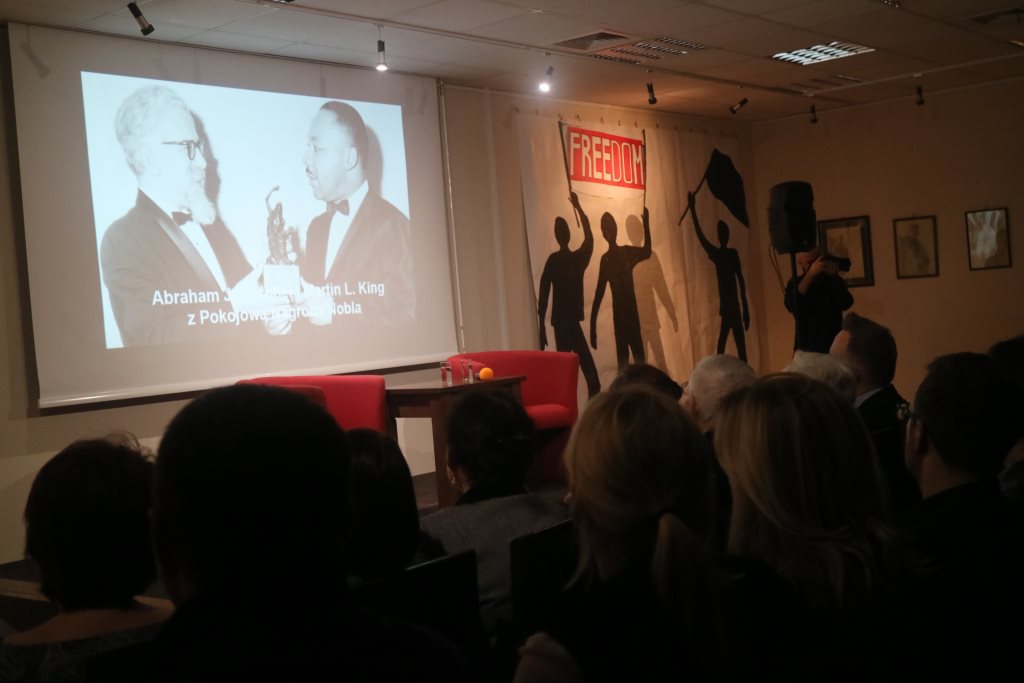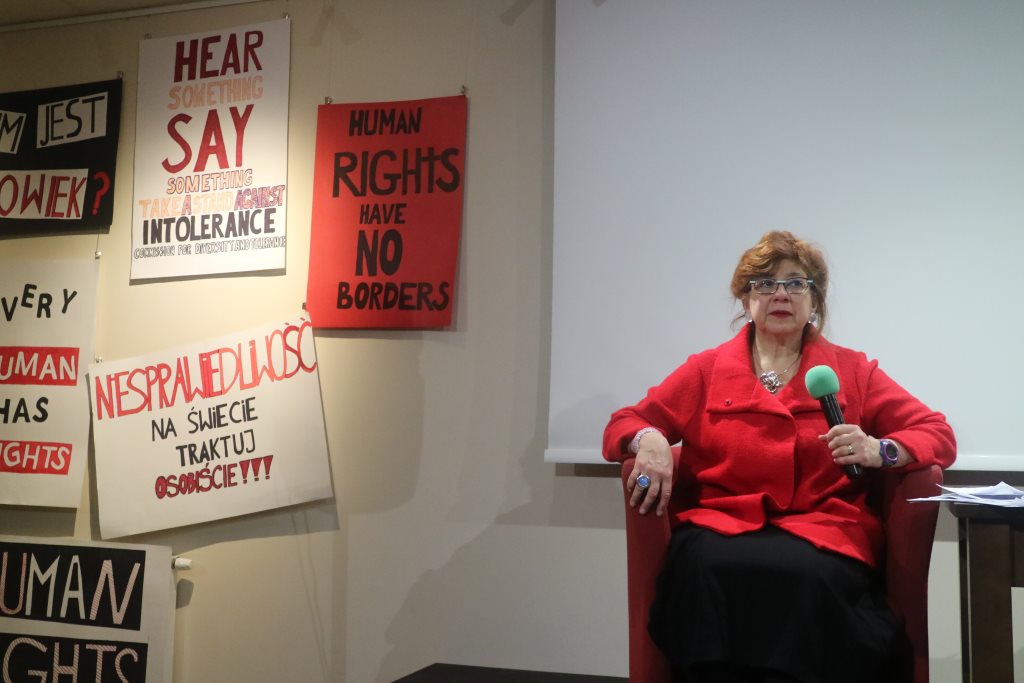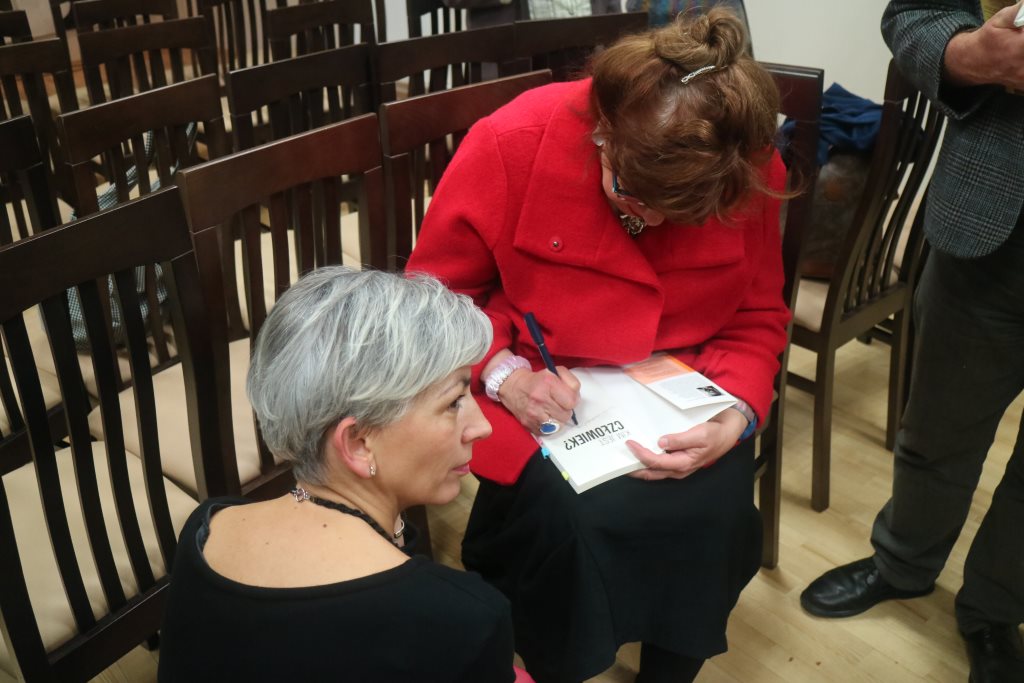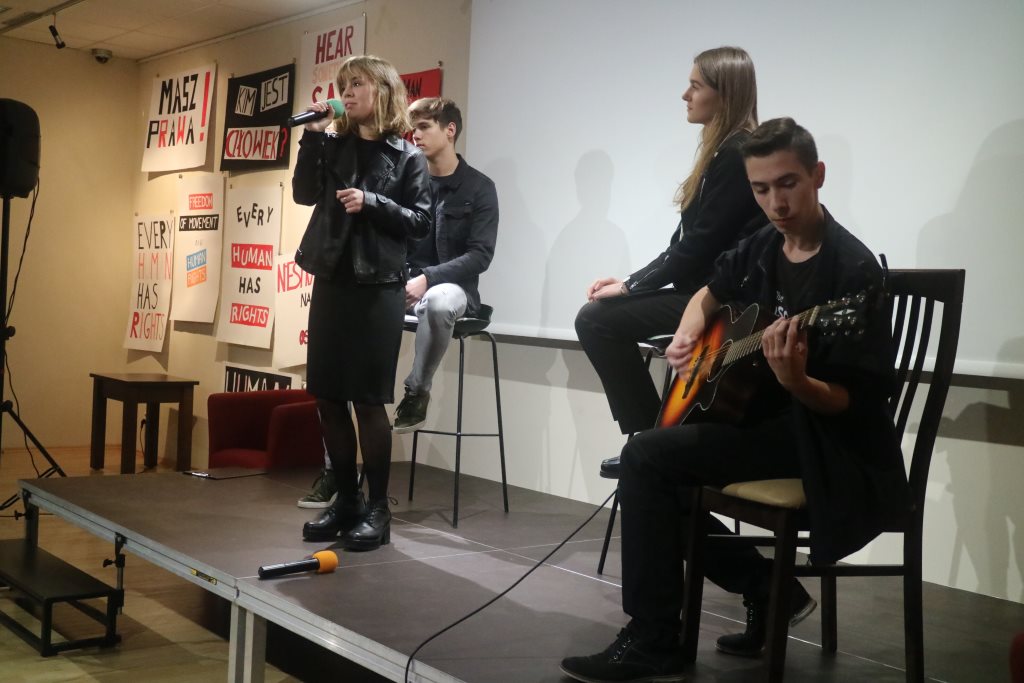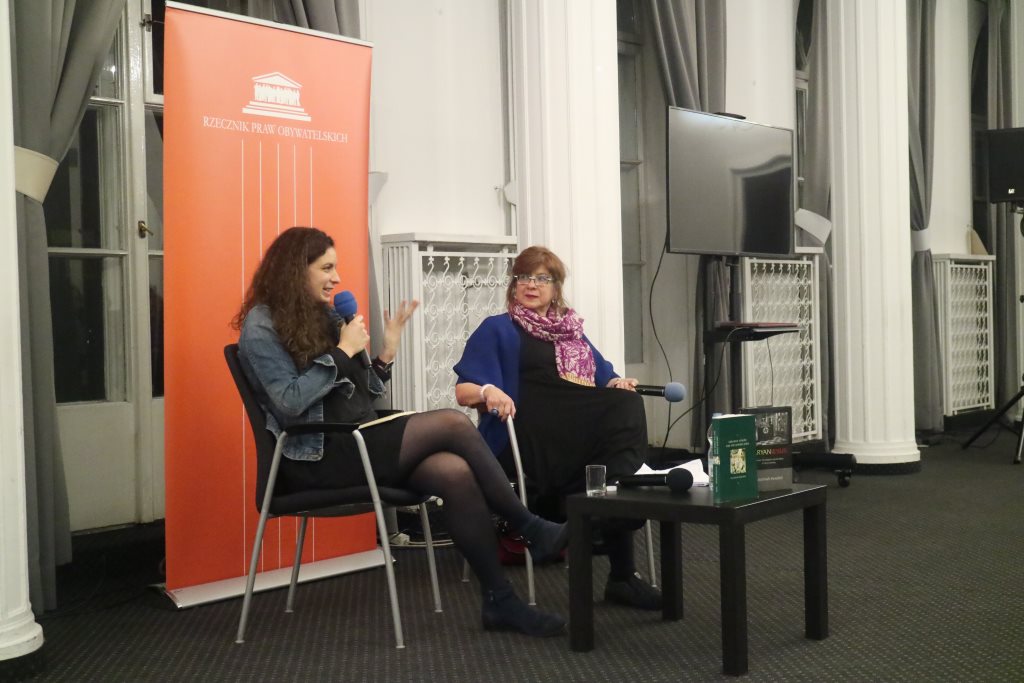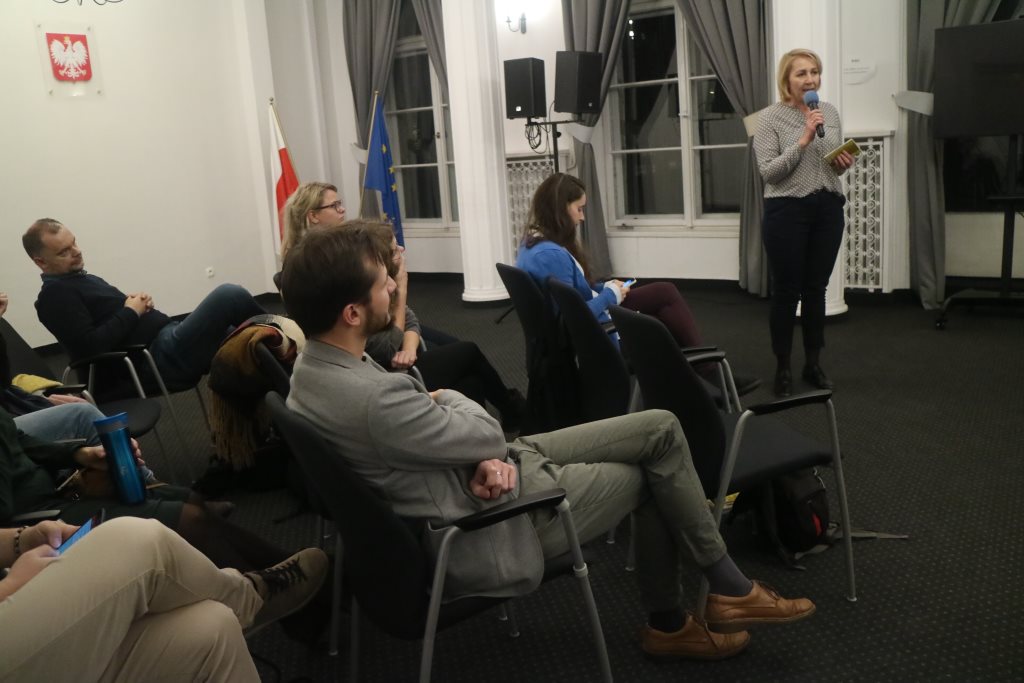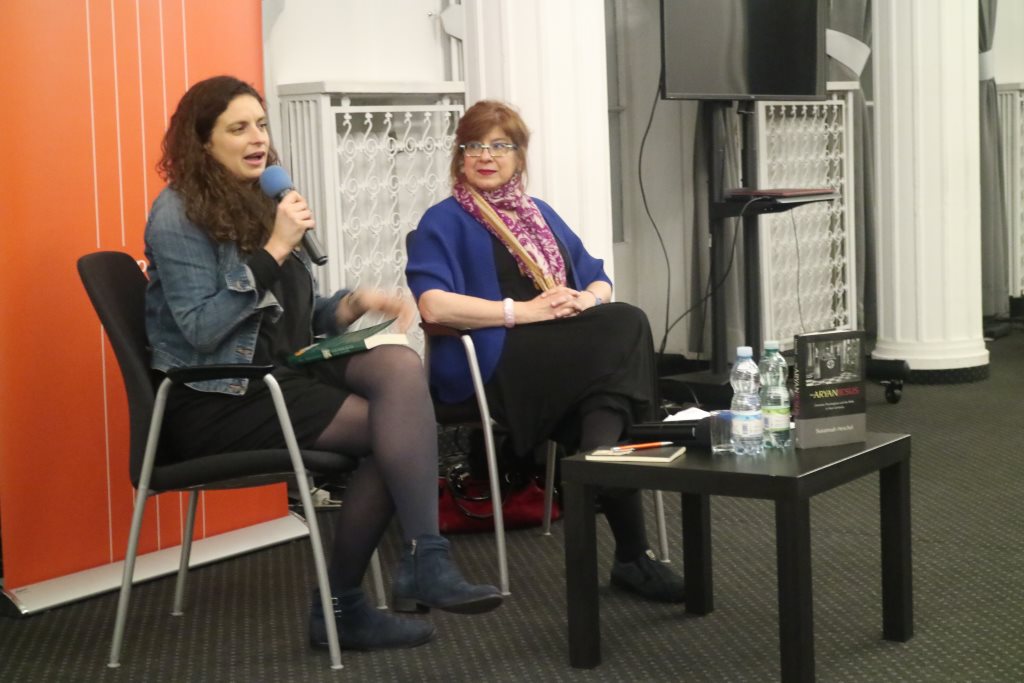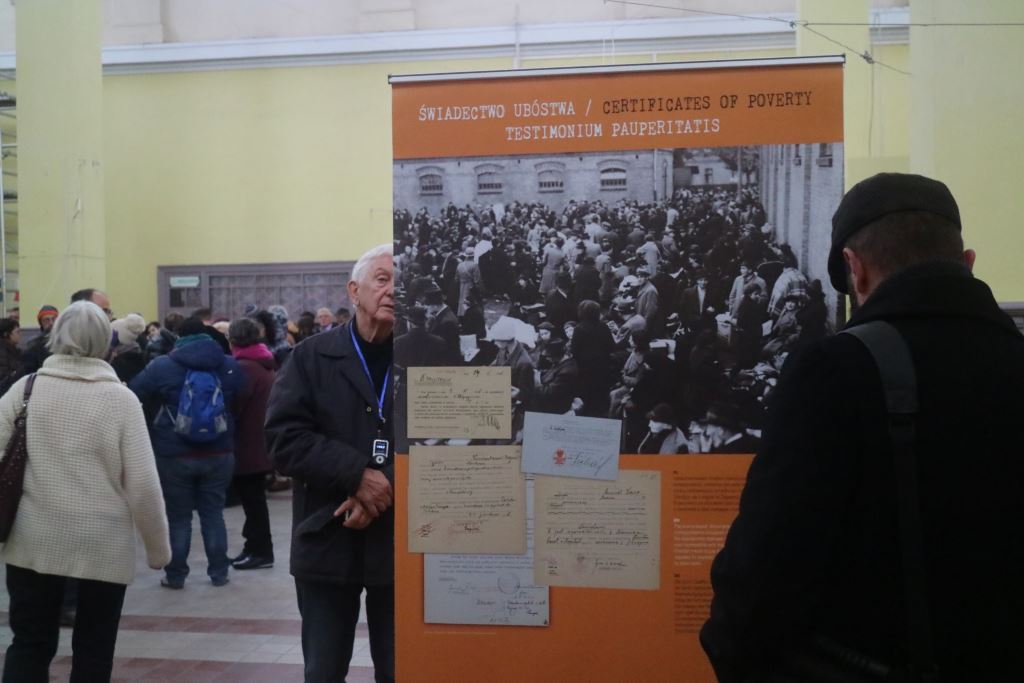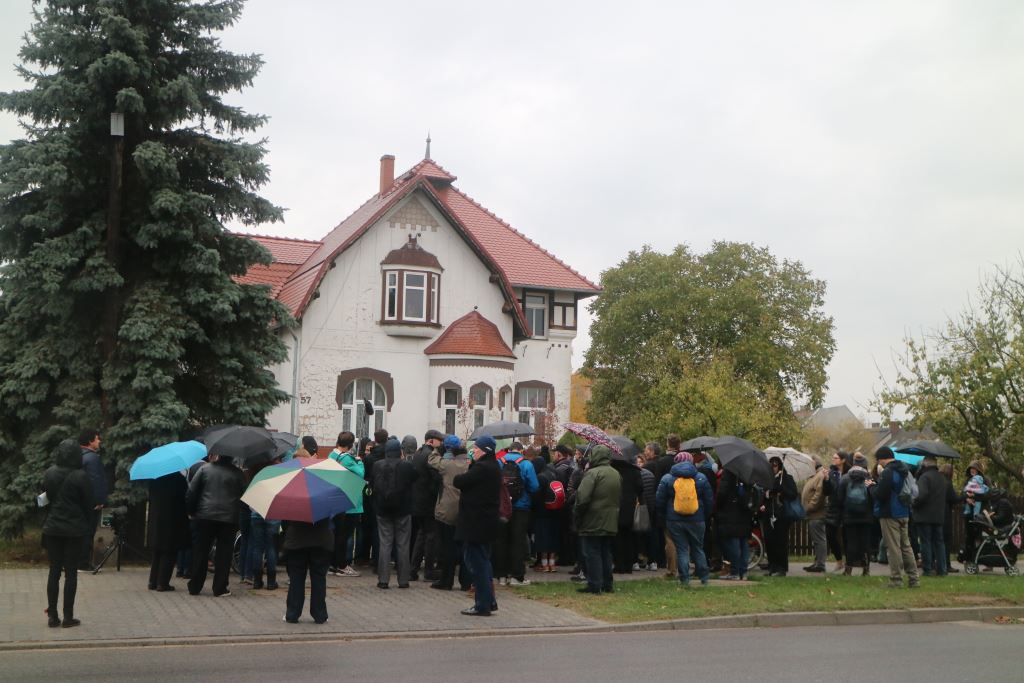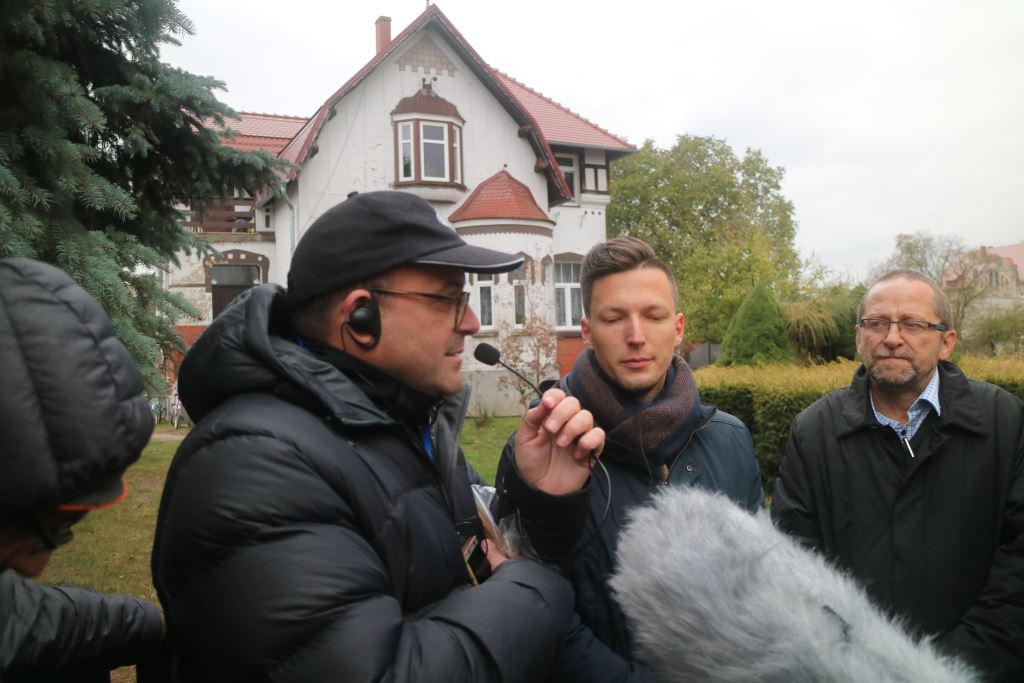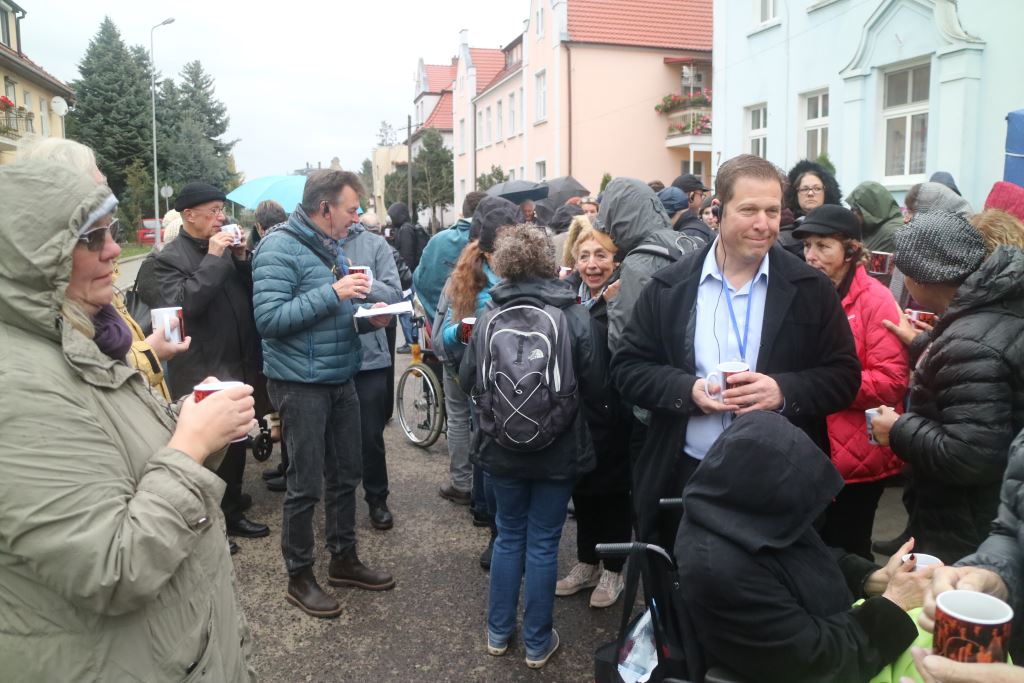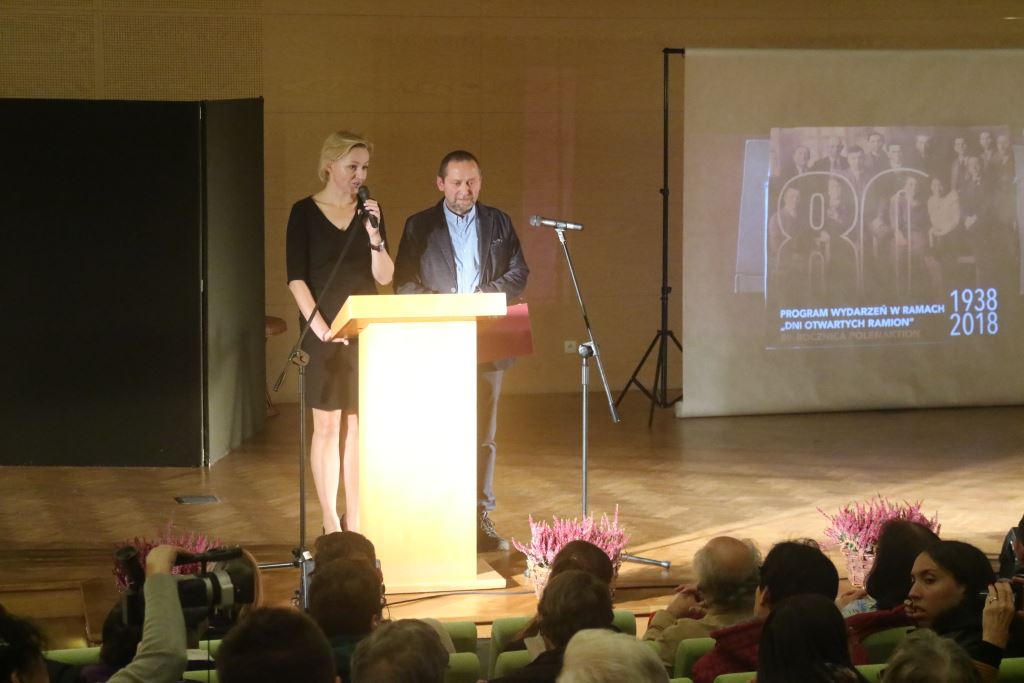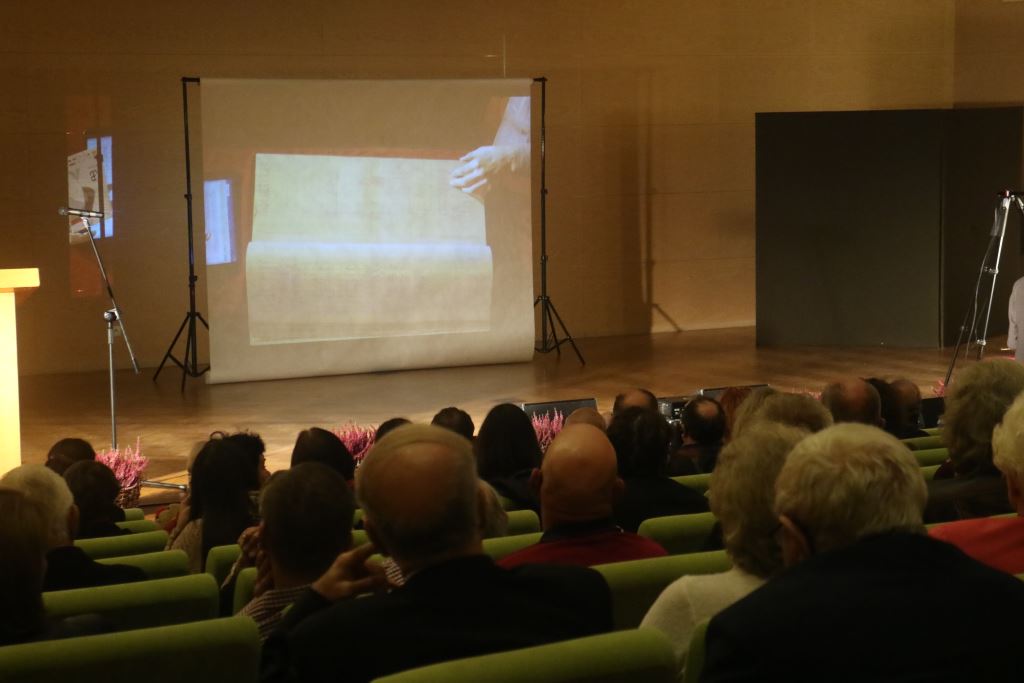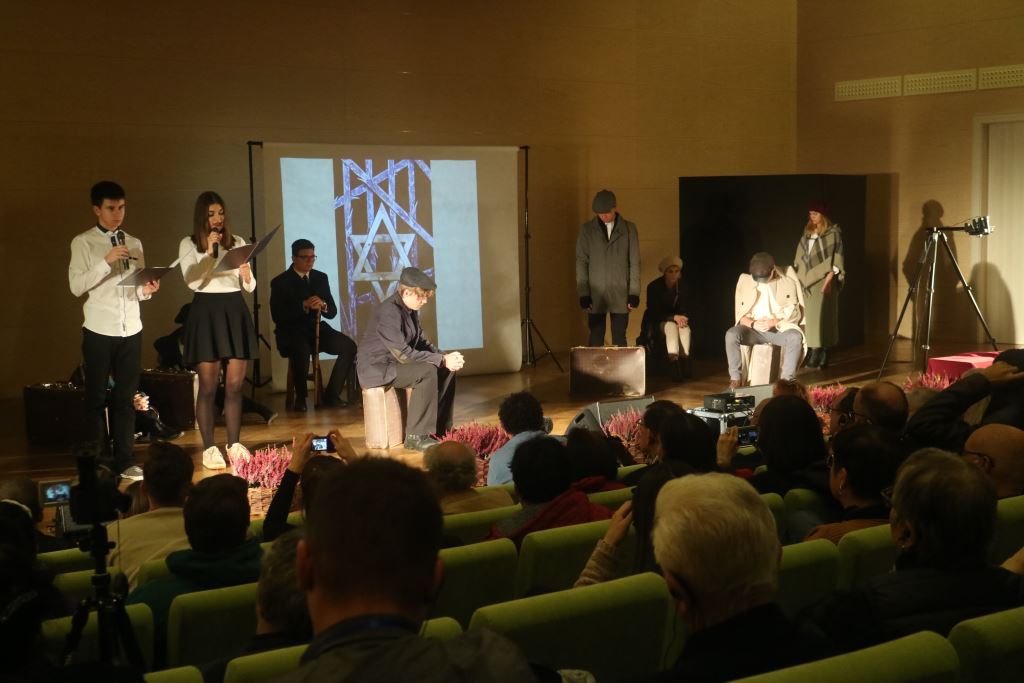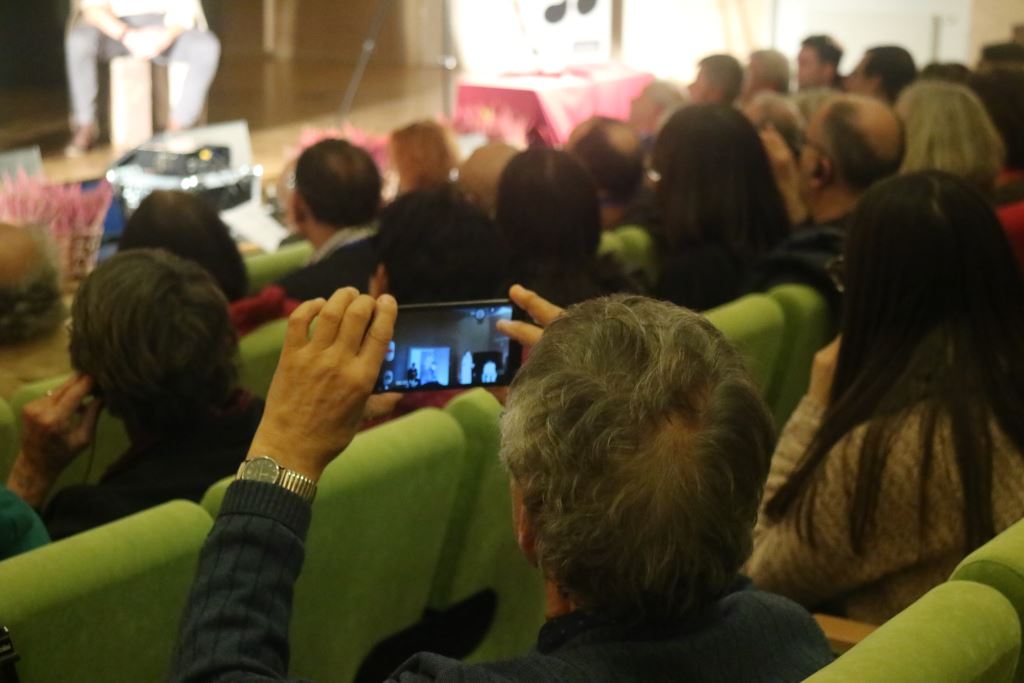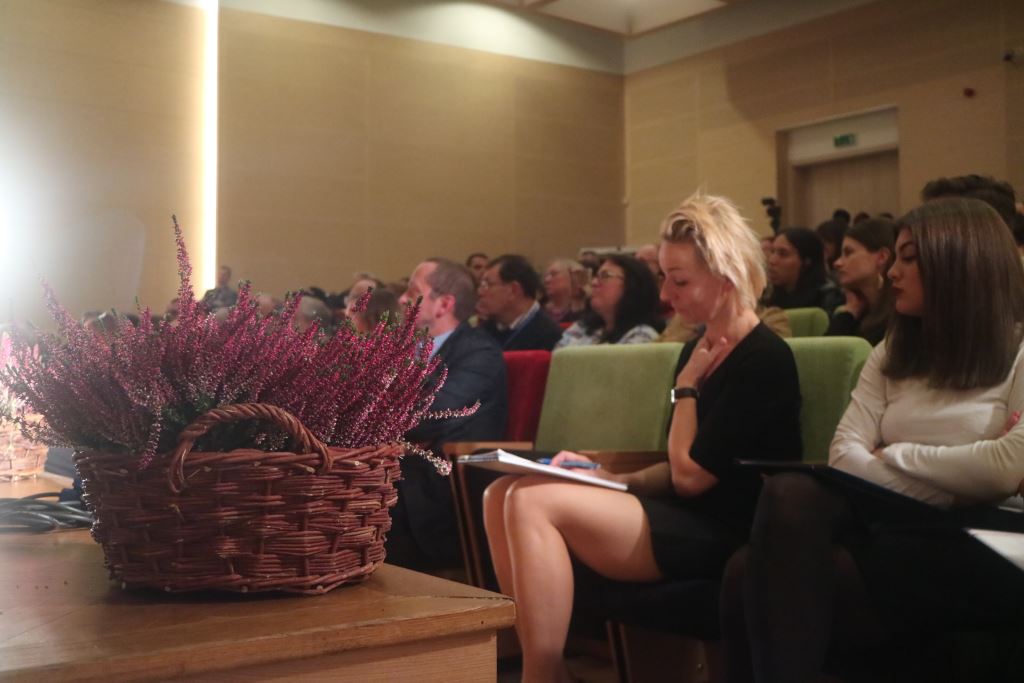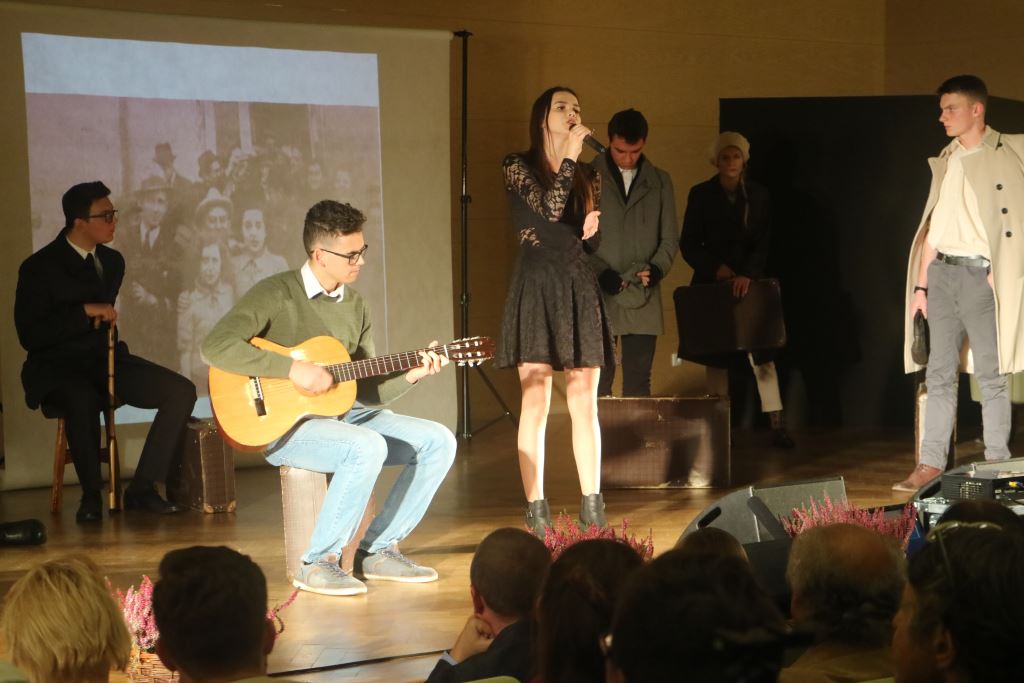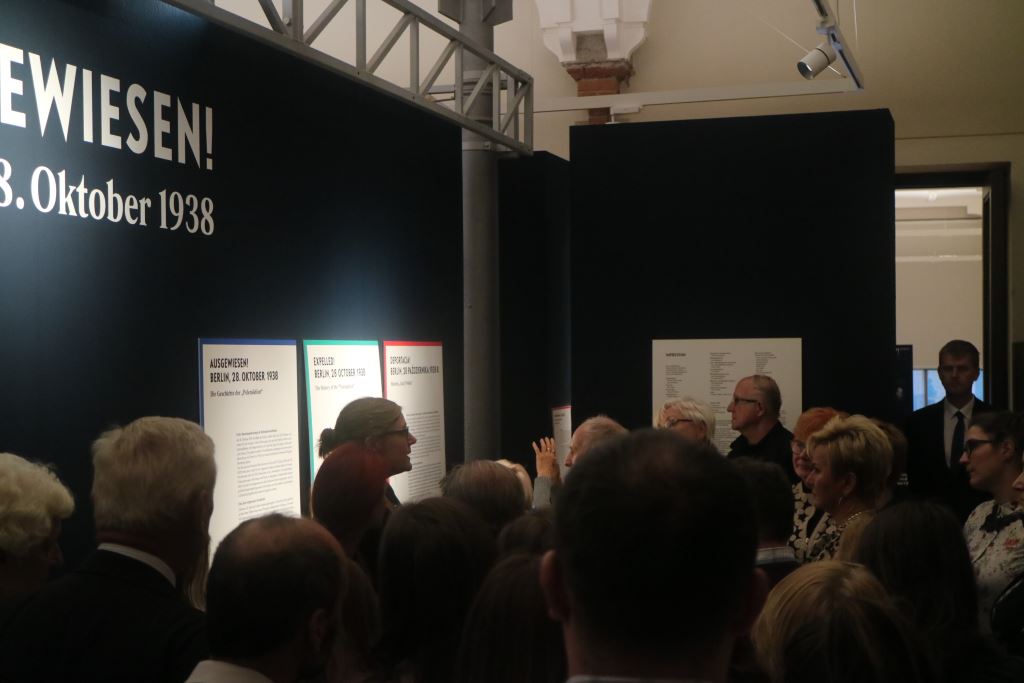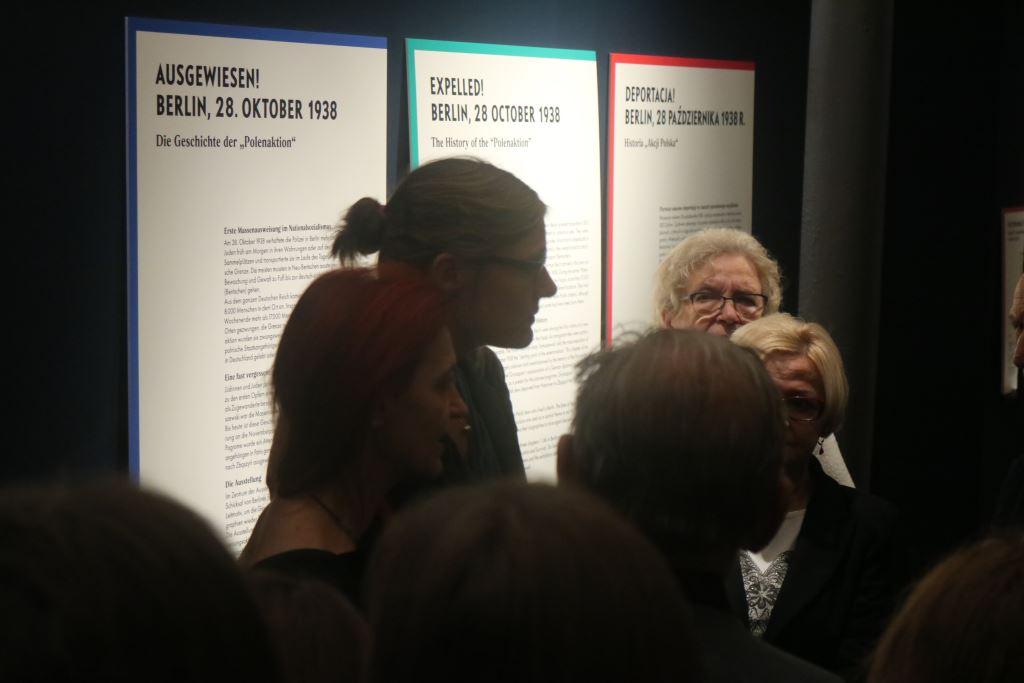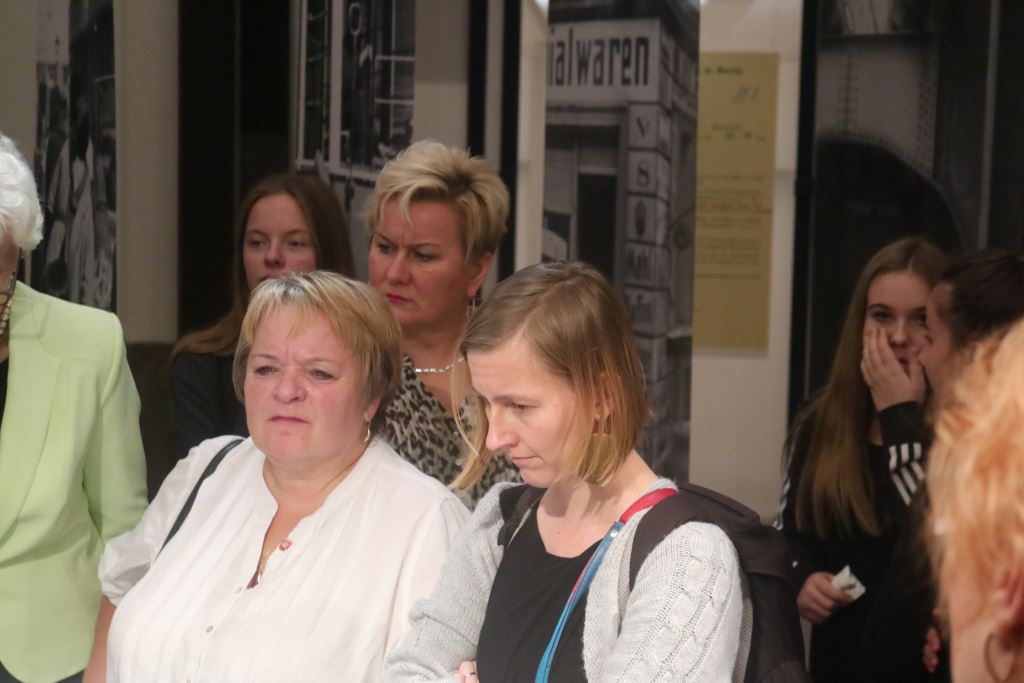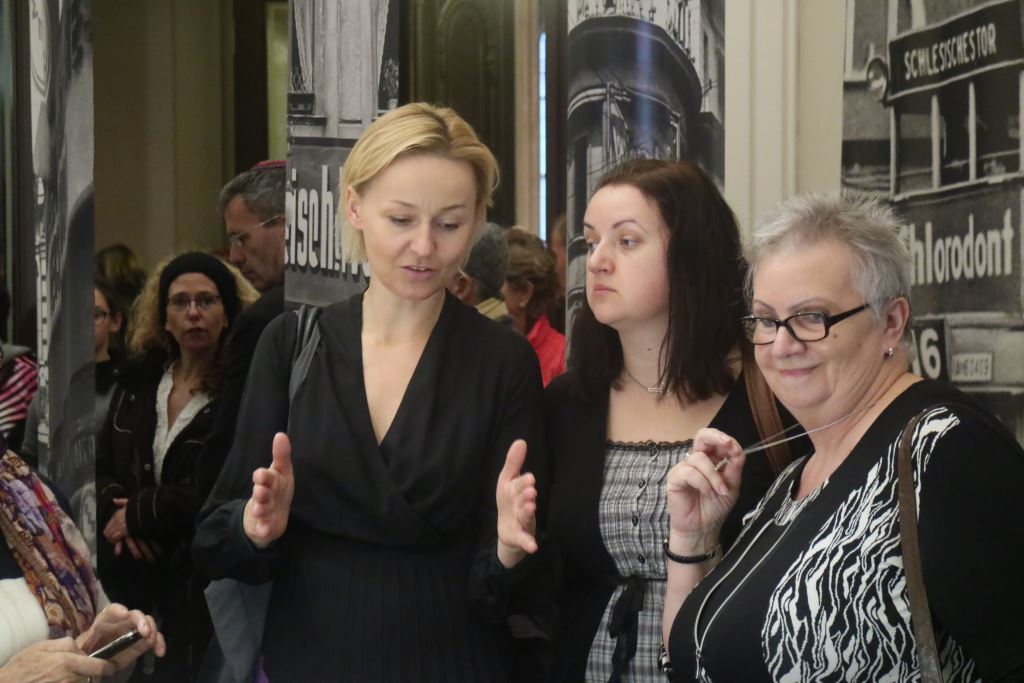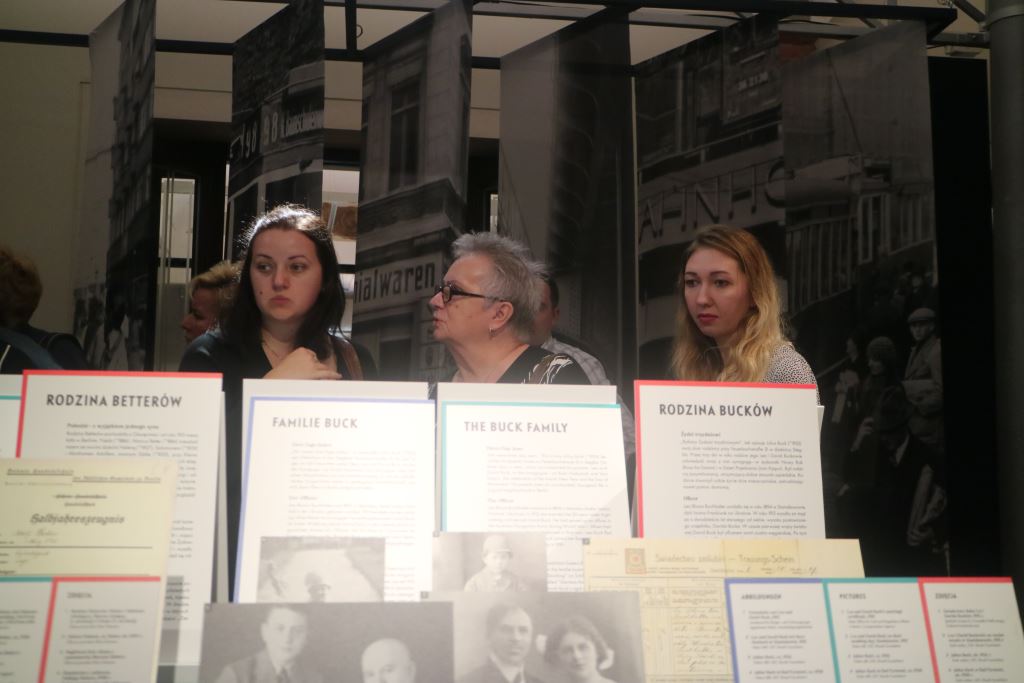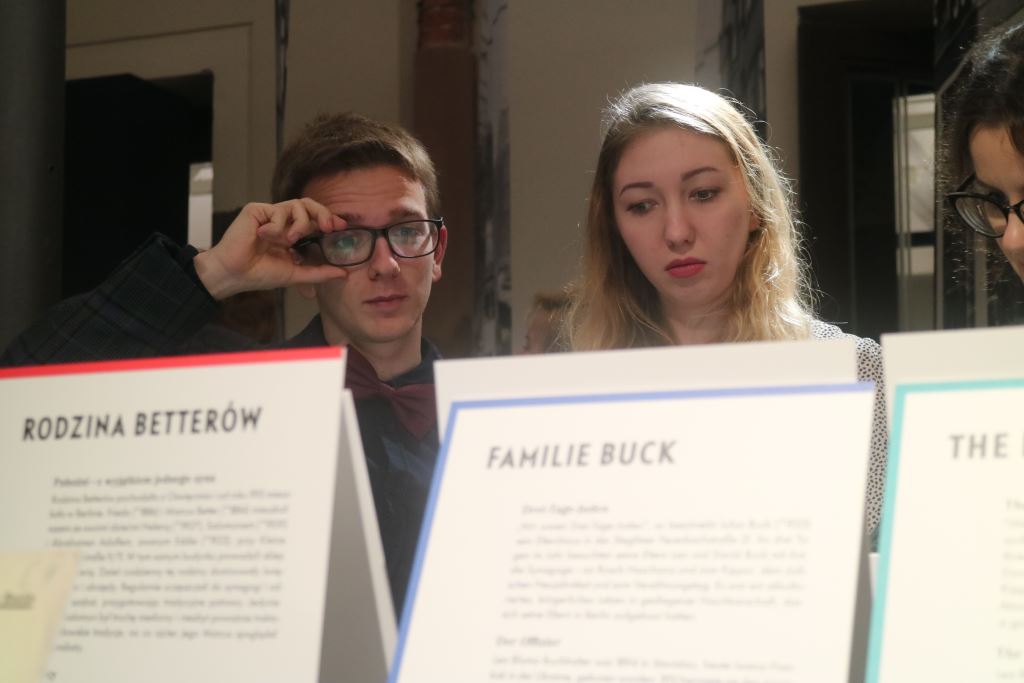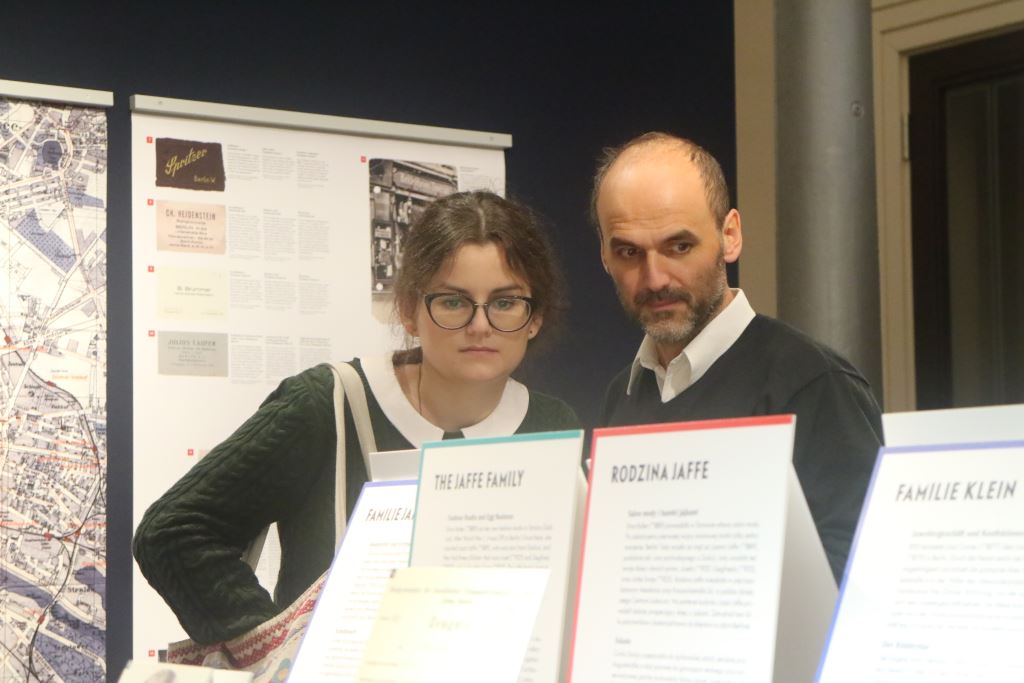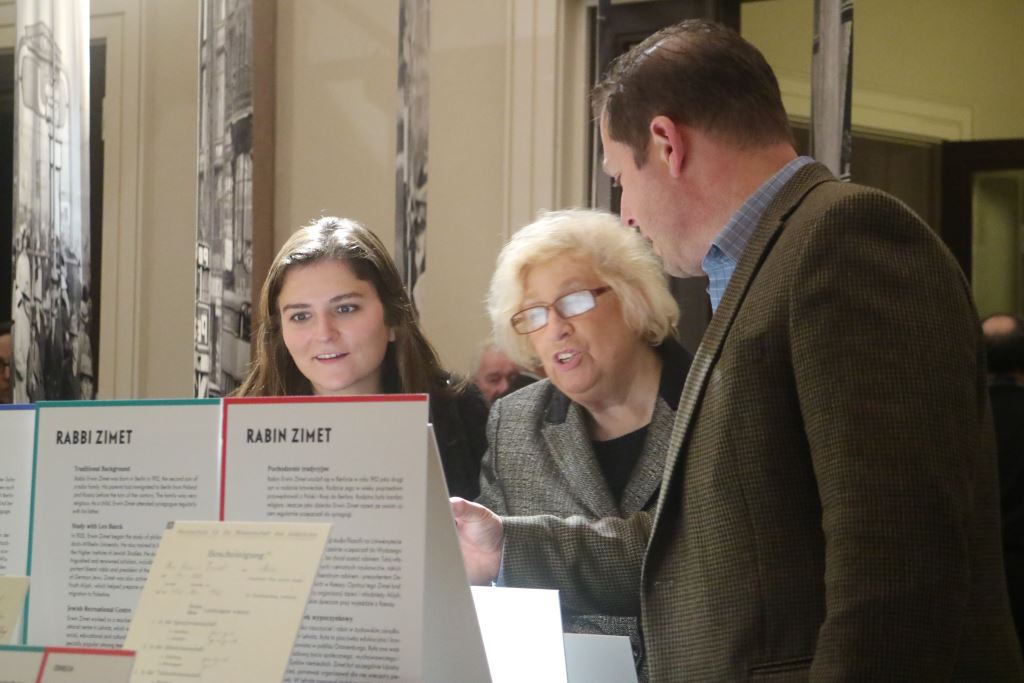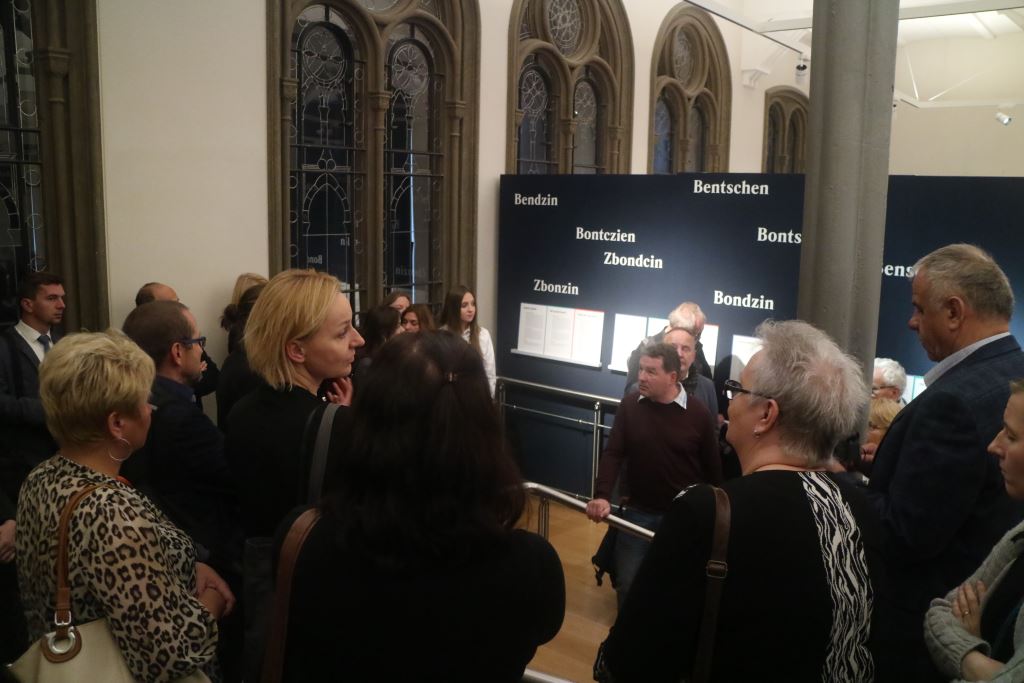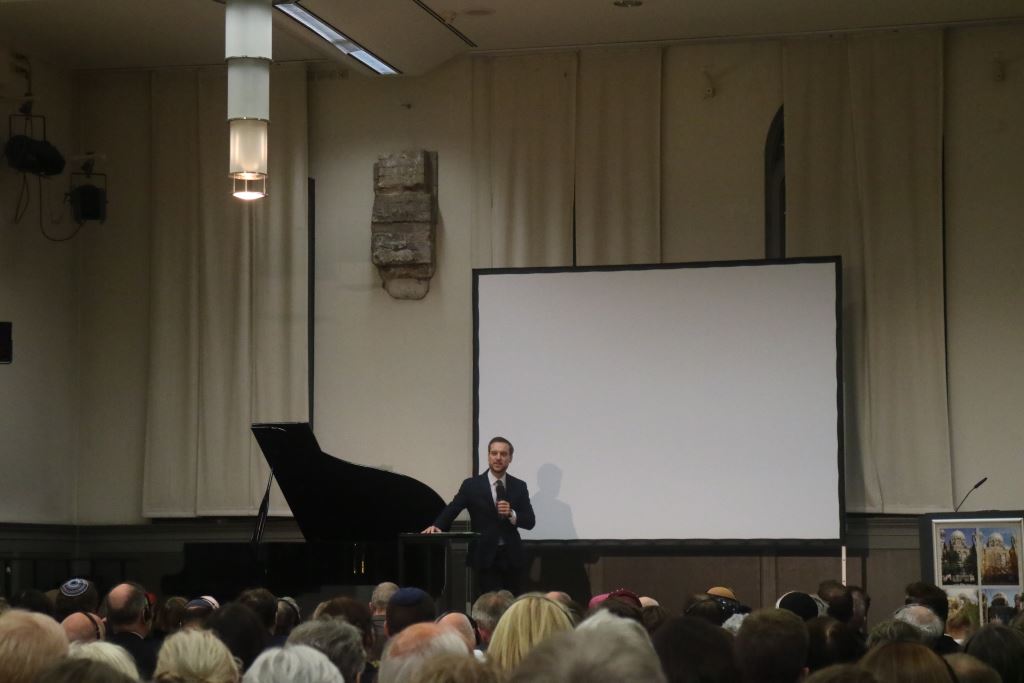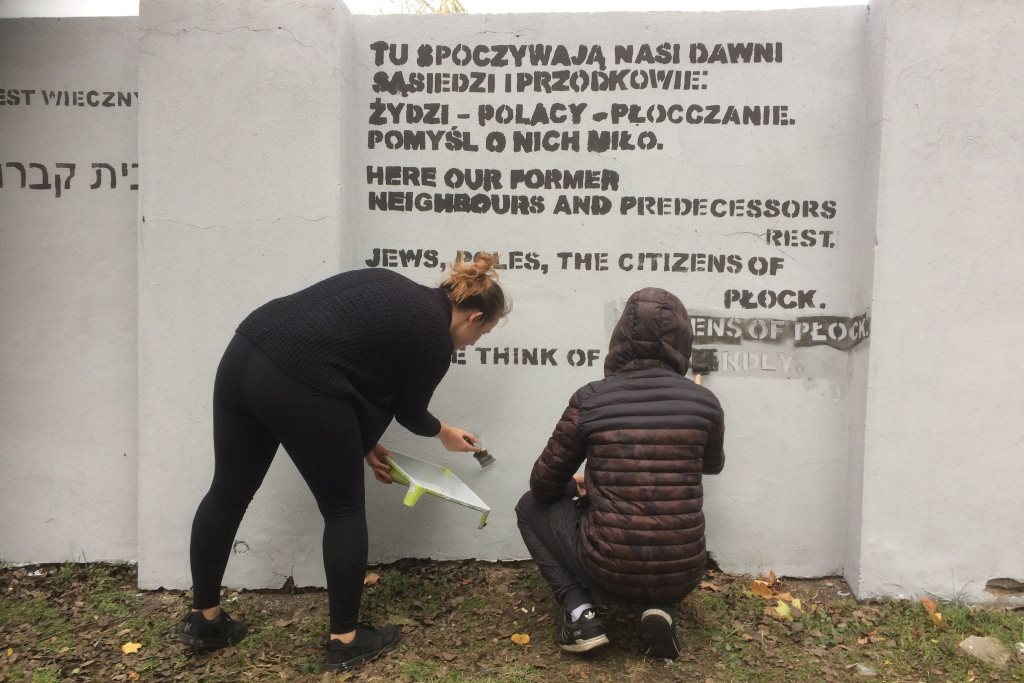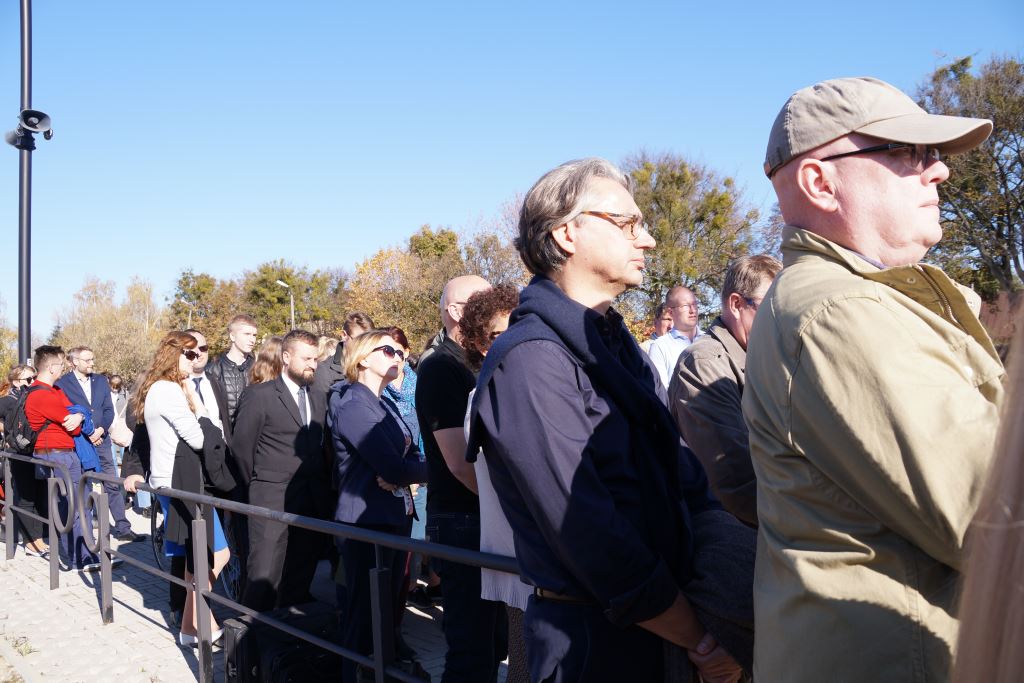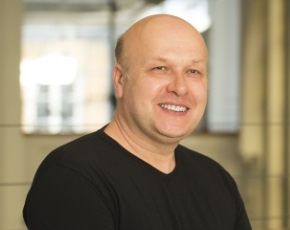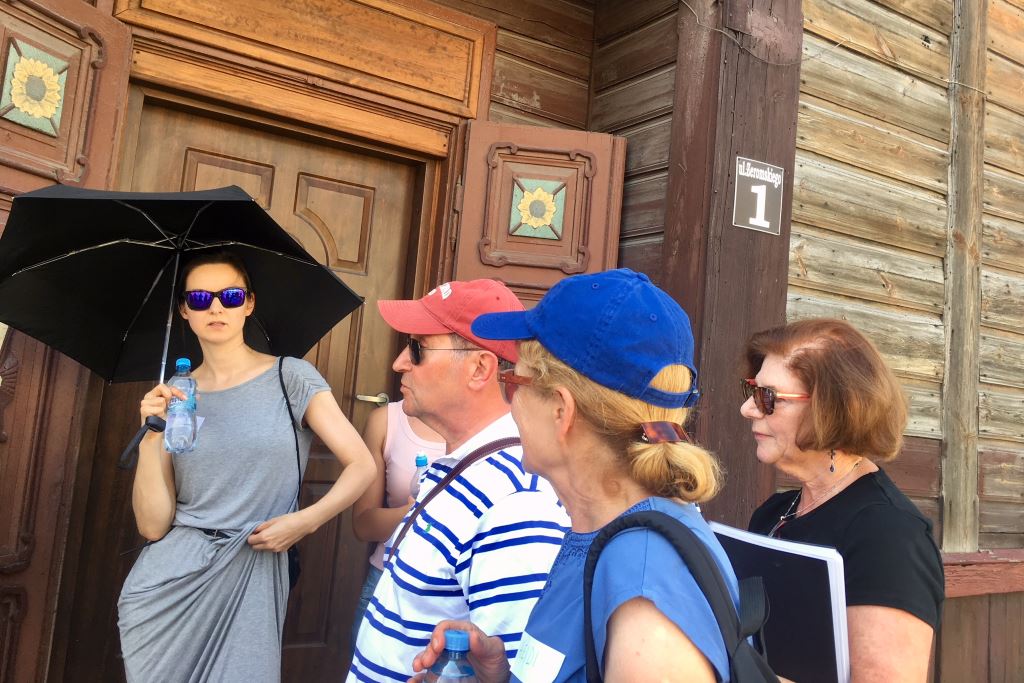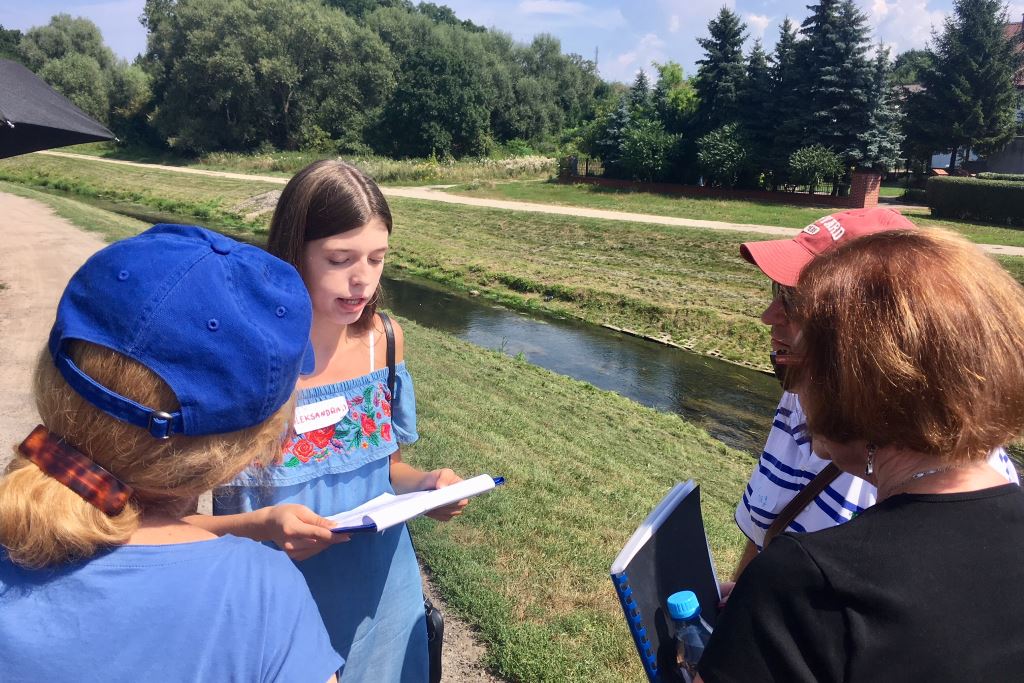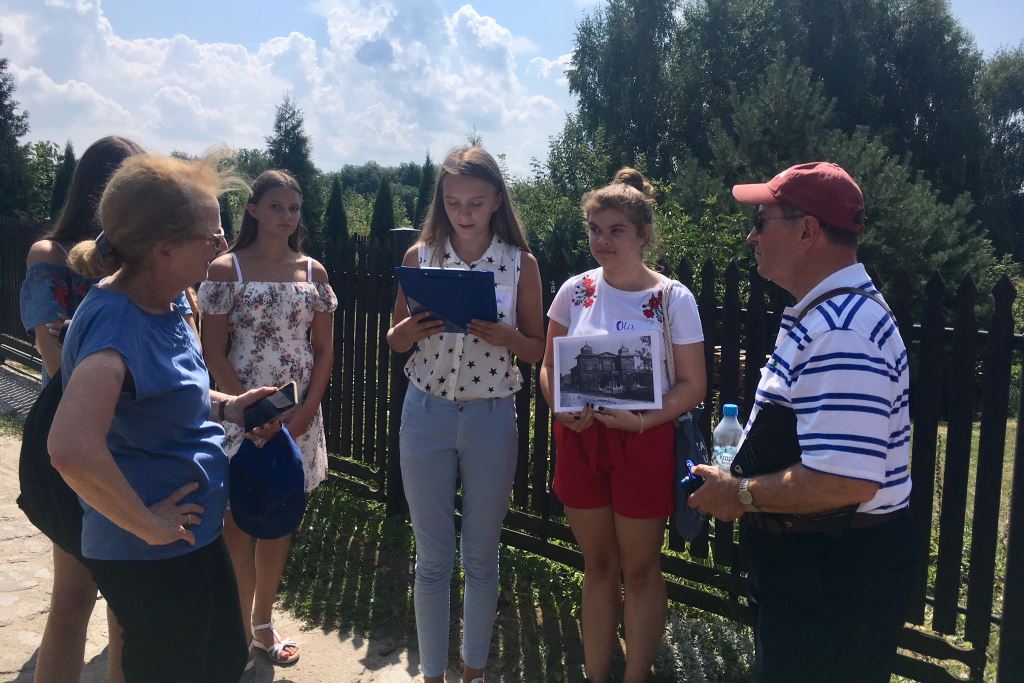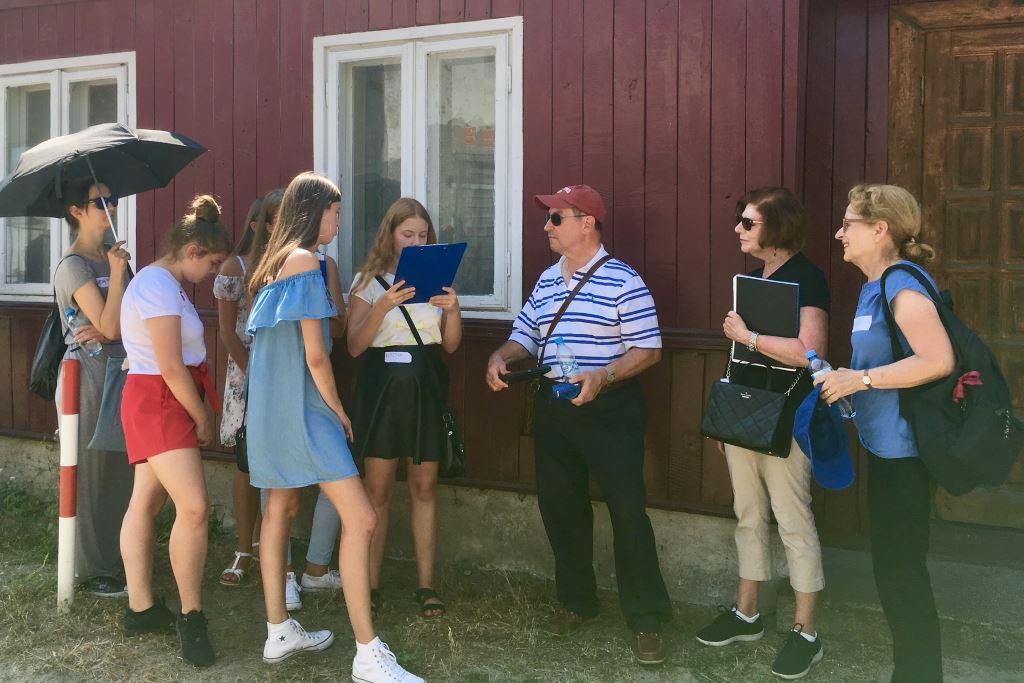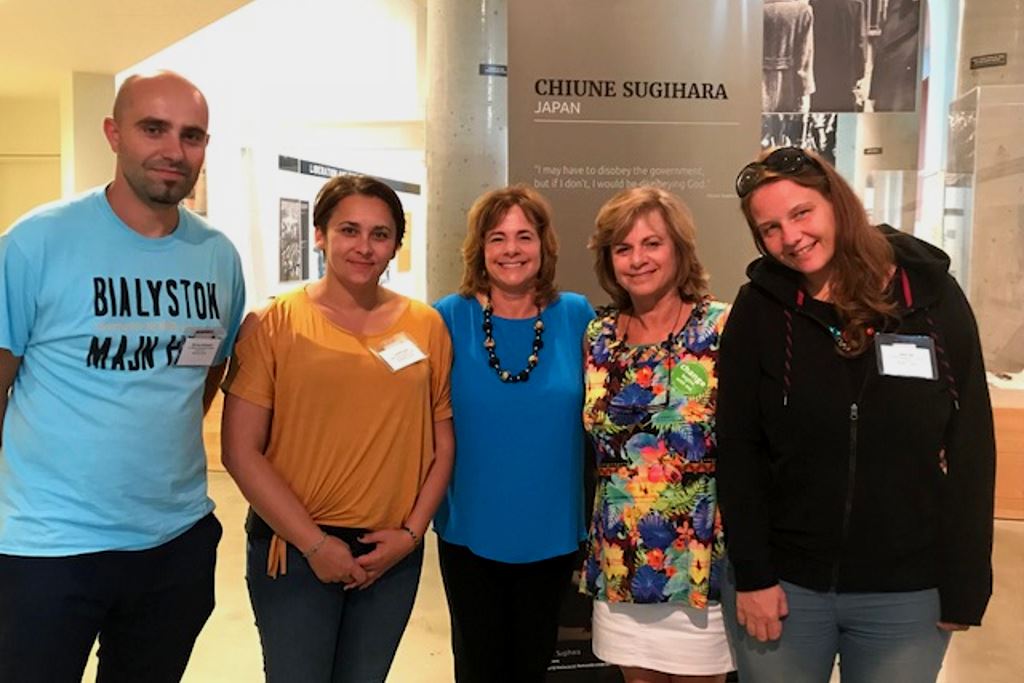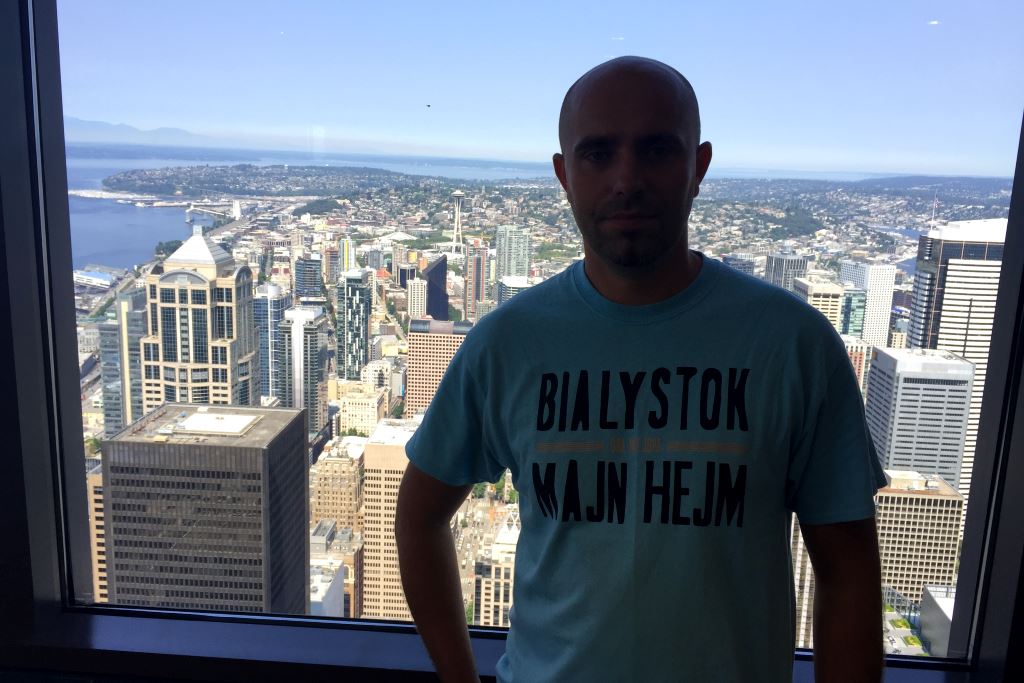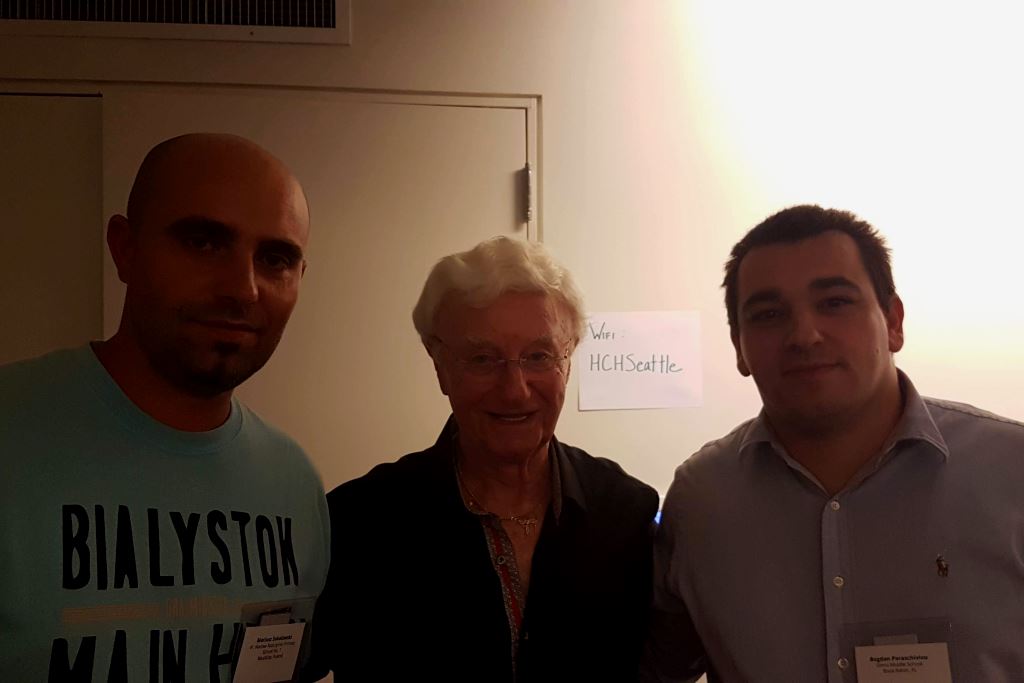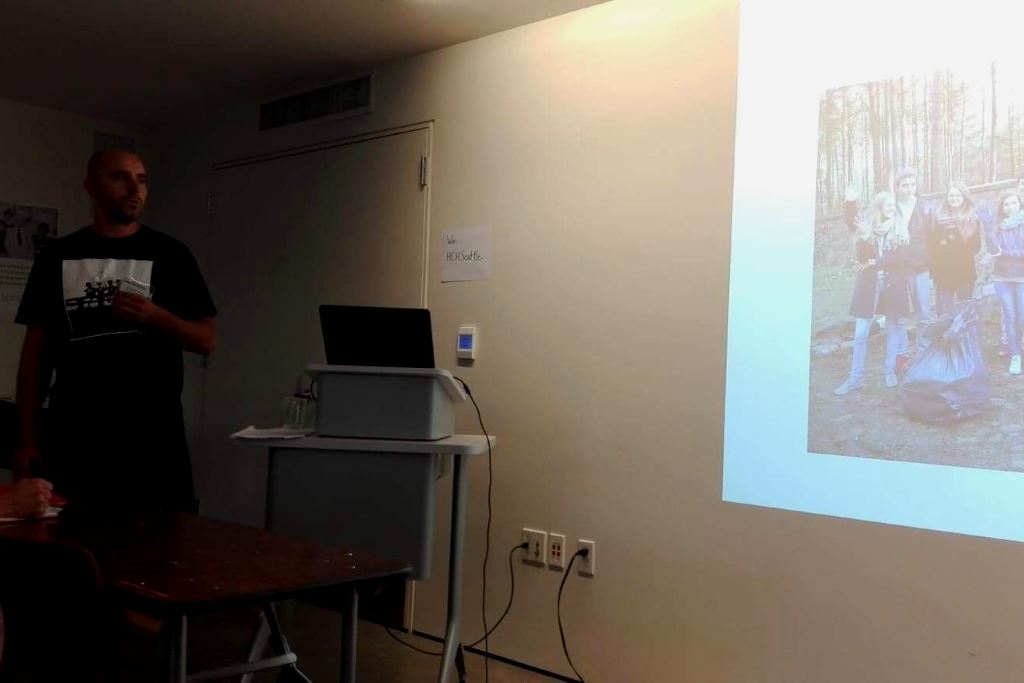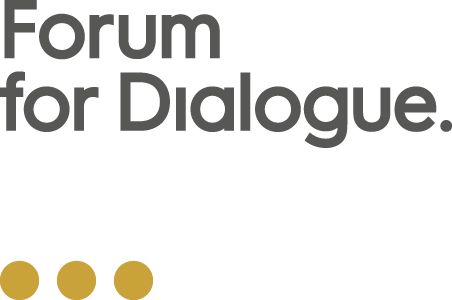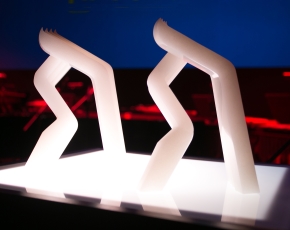
For the fourth time in history, the POLIN Museum of the History of Polish Jews awarded individuals, institutions, and organizations preserving the memory of Polish Jews during the POLIN Award Gala. Among the 7 nominees were the Leaders of Dialogue: Kamila Klauzińska from Zduńska Wola, Łukasz Parus from Zagórów, and Katarzyna Winiarska from Białowieża.
Selected from among over a hundred candidates, the nominees are recognized for their individual contributions towards building mutual understanding and respect between Poles and Jews. The main prize was awarded to Tomasz Wiśniewski, an activist working tirelessly to preserve the memory of Podlasie’s Jewish communities, while Dariusz Popiela, of the Shtetl of Tsanz, and Magdalena Lewkowicz, a teacher and activist from Mrągowo received honorable mentions.
Recognizing that the work of all of the nominees embodies Forum’s mission, we would like to congratulate them all: winners, nominees, and candidates! We appreciate your tireless and important work!
Photo: M. Starowieyska / POLIN Museum of the History of Polish Jews. From the left: Kamila Klauzińska, a Leader of Dialogue from Zduńska Wola, Łukasz Parus, a Leader of Dialogue from Zagorów, Katarzyna Winiarska , a Leader of Dialogue from Białowieża, and Dariusz Popiela, an activist of the Shtetl of Tsanz.
Marcin Dziurdzik December 5th, 2018
Posted In: EN News 2018
Leave a Comment
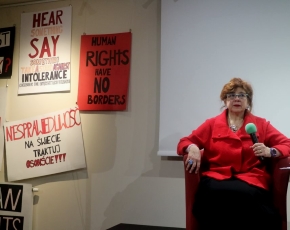
In 2017 Forum has introduced new funding opportunities for Leaders of Dialogue to pursue projects either aimed at establishing relations with descendants of Jews from their towns or create permanent commemoration of the local Jewish heritage that leads to a greater awareness of that history locally. One of the projects made possible thanks to the funding was 4th Days of Jewish Culture “The Close and the Distant” in Mińsk Mazowiecki organised by a local Leader of Dialogue, Katarzyna Łaziuk. This year’s event was aimed at answering the question “Who is man?” because it was asked by Abraham Joshua Heschel, one of the greatest Jewish philosophers, the descendant of Jakub Perłow, a local tzadik from Mińsk Mazowiecki. Its importance was recognized by the presence of special guest of honor – his daughter, prof. Susannah Heschel, an American scholar, the Eli Black Professor of Jewish Studies at Dartmouth College, working on Jewish-Christian relations in Germany during the 19th and 20th centuries, the history of biblical scholarship, and the history of anti-Semitism. She met with Mińsk Mazowiecki residents at the Municipal Public Library and talked about the history of the Heschel family and their connections with Mińsk. The meeting was accompanied by a concert “Do not be afraid my little brother” prepared by secondary school students as a tribute to Abraham J. Heschel, who together with Martin Luther King Jr. walked in a famous march from Selma to Montgomery to oppose racial discrimination.
The events surrounding the 4th Days of Jewish Culture continued between November 24-26, and included workshops for kids and students, guided tour of the town “In the search for a human being. Discovering the traces of Jews from Mińsk Mazowiecki”, philosophy workshops focused on texts by Abraham J. Heschel, and lessons devoted to the history and ideas of the Civil Rights Movement and its leader Martin Luther King Jr. The participants even got a special set of postcards presenting the history of the Heschel family and their connections with Mińsk!
After the 4th Days of Jewish Culture prof. Heschel went to Warsaw, where she gave an inspirational talk “Jewish Jesus vs. Aryan Jesus: Why did Theologians Embrace Antisemitism?” focused on the way in which theologians contributed to the whitewashing of the Bible. The event was organized by Forum for Dialogue and the Office of the Commissioner for Human Rights in Poland. It was followed by a interesting discussion with audience moderated by Zuzanna Radzik, Forum’s member of the board.
Project financed by the Ledor Wador Foundation.

Marcin Dziurdzik December 1st, 2018
Posted In: EN News 2018
Leave a Comment

Forum has introduced new funding opportunities for Leaders of Dialogue to pursue projects either aimed at establishing relations with descendants of Jews from their towns. One of the projects made possible thanks to the funding is “Zbąszyń’s Days of Open Arms”, led by Anita Rucioch-Gołek, a Leader of Dialogue from Zbąszyń. Last summer Anita conducted the first part of her project, and organized a visit of Isabella Webber, a German-born Polish Jew transported to Zbąszyń as part of Polenaktion.
When Anita learned that Berlin’s Centrum Judaicum is organizing the commemoration of Polenaktion – the very first German official ceremony marking the anniversary of those tragic events – and that Wojciech Olejniczak of Zbąszyń’s Fundacja Tres is already involved in the making of Centrum’s exhibition about the Polenaktion, she decided to broaden the scope of her project. She invited a group of the descendants of families expelled from Nazi Germany to Zbąszyń from Great Britain, Australia, and Israel to visit the town and meet the incredible group of dedicated people she collected around herself in her engagement of protecting and popularising the local Jewish heritage.
What followed that decision was a really intense day in Zbąszyń. The descendants of Zbąszyń’s refugee families arrived to see the temporary exhibition depicting the events of 1938 that was arranged in the very symbolical space of town’s railroad station. Then Wojciech Olejniczak, a real expert in town’s Jewish history and topography guided a tour of all important places connected to Polenaktion history. Among them were the houses where the refugees were temporarily placed, the post office building (one of the most important places for people stranded in town and trying to make contact with relatives), and house where Emanuel Ringelblum (a renowned Polish-Jewish historian, politician and social worker, known for his Notes from the Warsaw Ghetto, Notes on the Refugees in Zbąszyn chronicling the deportation, and the so-called Ringelblum’s Archives of the Warsaw Ghetto) stayed during his coordination of the relief efforts he conducted in Zbąszyń on the behalf of the American Jewish Joint Distribution Committee.
After the trip Anita invited her guests for a commemorative ceremony at the Zbąszyń’s concert hall. Representatives of the local government spoke about the importance of remembering the tragic events their town witnessed, while Wojciech Olejniczak gave a powerful speech urging the audience to not forgot the ambiguous stance taken by the Polish authorities during the crisis of 1938, while remembering and acknowledging the effort of many of Zbąszyń’s residents, both Polish and Jewish, who showed bravery, compassion, and humanity in those difficult times and were providing help at sometimes great personal expenses. After the speeches, local students performed an artistic program depicting the odyssey of the refugees. And that was a real highlight of the visit – as one of the participants summarized it, he wasn’t totally convinced that coming to a town where his ancestors suffered such tragic events was a good idea, but seeing the involvement and enthusiasm of the young generation, working towards the preservation of their town’s Jewish memory, totally convinced him that it was exactly the right time and place to be.
It is worth expressing that Anita’s projects truly contribute towards a real, meaningful dialogue and establishing new connections. Her former students, alumni of the School of Dialogue program at the local school and Zbąszyń’s residents who participated in the events had an unique opportunity to interact with the descendants, share their knowledge of the historical events, and hear their heart-moving stories. Among them was a very emotional testimony of one of the Australian guests, who told a story how his father won a place on a ship bound for Australia in a lottery organized at the refugee camp, while his cousin did not, and later died in the Holocaust. We are sure that many lasting connections were forged during that amazing day!
photo: J.Szkarłat, M.Dziurdzik
On the second day of the commemorations, Polish delegation – consisting of representatives of local government, members of Zbąszyń’s social and cultural organizations, and Anita Rucioch-Gołek along with her former students of Zbąszyński Balagan, alumni of the School of Dialogue program – went to Berlin to participate in the official opening of Expelled! Berlin, 28 October 1938. The history of the “Polenaktion” temporary exhibition. It was created by Centrum Judaicum based in Berlin’s New Synagogue and tells the story of six Jewish Berlin families – immigrants with Polish citizenship – who were arrested by the Nazis in their flats or on the streets and transported to the German-Polish border to be forcefully deported to Poland. The exhibition’s powerful impact comes from this curatorial decision of telling this tragic story, one of the first preludes to the Holocaust, through the very personal stories of those families. Students of the Free University of Berlin assisted in the research of the family biographies presented on the exhibition, developing strong bonds with the descendants in the process.
The exhibition’s opening importance was recognized by representatives of German government Petra Pau, the vice-president of German Bundestag, and minister of state Michelle Müntefering, members of Berlin’s Jewish community, and, most importantly, the descendants of the families deported in 1938. The ceremony was moderated by Peter Frey, editor-in-chief of the ZDF, one of the main German public-service television broadcasters. ZDF published the relation from the exhibition’s opening in one of their prime-time programs that usually gathers an audience of approximately 2.5 million viewers.
photo: J.Szkarłat, M.Dziurdzik
Polenaktion, “Polish Action,” refers to arrests and expulsion of Polish Jews living in Nazi Germany. In October 1938, Polish Ministry of Interior Affairs announced an ordinance requiring that Polish citizens living outside Poland obtain an endorsement stamp on their passports before October 30. Any passport without the stamp would become void and the owners of the passport would have their citizenship rights revoked. When Polish Jews living in Germany tried to fulfill this requirement, they were denied for various reasons. Fearing the prospect of thousands of Polish Jews unable to legally emigrate, Nazi government decided that Polish Jews were to be expelled from the country. From October 27 until October 29, the day before the Polish decree regarding the eligibility of passports was set to take effect, Nazi authorities arrested approximately 17,000 Polish Jews, cancelled their German permits of residence, and forcefully transported them to the German-Polish border. Most of them were then forced to march across the border to the town of Zbąszyń.
Fragments of “Next year in Jerusalem!”, a film commemorating the deportations of Polish Jews from Germany to Poland in 1938 (in Polish).
The Polish border authorities were overwhelmed at first by the unexpected influx of people and during the first day of expulsions they allowed thousands of Polish Jews entry into the country, but soon responded by closing the border down. As a result, in the end of October thousands of homeless Jews resided in no-man’s land along the border. Most of them ended up in Zbąszyń, where a refugee camp was established, living conditions were severe, and various relief efforts were conducted by Polish Jewish organizations and some of the Zbąszyń’s residents, Jewish as well as Polish Catholic. Some of them were able to immigrate to other countries or were allowed to travel to relatives living elsewhere in Poland, but most of the expelled remained in a camp for almost a year.
It was not until just prior to the Nazi invasion of Poland in 1939 that the refugees of the Polenaktion gained access to Poland’s interior – many of them were later murdered in the ghettos and camps during the Holocaust.
For German-speakers we recommend watching two materials made by the ZDF about the Polenaktion and Centrum Judaicum’s exhibition – shorter one, made as a part of “heute – in Europa” series, and a longer one with the moving testimony of Rita Adler, a witness of tragic events of 1938.
Project financed by the Ledor Wador Foundation.

Marcin Dziurdzik November 29th, 2018
Posted In: EN News 2018
Leave a Comment

We are proud to share the heart-warming story of School of Dialogue alumni from Płock, who participated in the program in 2017 and now continue their involvement in preserving the memory of Jewish community of their town. Inspired and supervised by Dorota Cieślik, Forum’s educator who conducted workshops in Płock in 2017, they collaboratively painted a mural marking the place of Jewish cemetery, established in the end of 16th century and destroyed by Nazis during the war.
“Am I afraid that the mural will be vandalized by chauvinistic graffiti? Well, I’m afraid it’ll appear,” Dorota admits. “Such is the fate of street art pieces, they interact with the street and people using it. However, I know for sure that it will be well taken care of – it’s close to school and it will have its own guardians.”
Another mural was painted by the School of Dialogue alumni under the supervision of the local Leader of Dialogue, Agnieszka Mysakowska. Students from Wieluń affiliated with the Szlakiem wieluńskich Żydów / History of the Jews from Wielun initiative run by Agnieszka cooperated with the Fundacja Młodzi Propagują Sztukę – warsztaty djembe i graffiti, an organization promoting alternative art, and received support from local authorities. The newest street art piece is located between the buildings of the former synagogue and cheder, not far from the Lutheran parish building.
“The idea for a mural commemorating our Jewish neighbors was born in 2015,” says Agnieszka. “The first generation of School of Dialogue students started to look for the right spot, and their efforts were continued by the second generation of students. The third generation finally succeeded.
The mural is not a simple recreation of a pre-war photo, but rather a powerful symbol. The walls represent the war, the figures symbolize the residents of what was once a diverse society, the synagogue stands for the Jewish community and the sun represents the rise of awareness of Wieluń’s Jewish past among the town residents, while the city hall serves as an icon of Wieluń itself. The piece is supposed to inspire a reflection on today’s world. The past has already happened and we cannot change it, but it is up to us how the present and the future will look like. Will we try to fix the world just a little bit? Will we respect each other?”
Marcin Dziurdzik November 22nd, 2018
Posted In: EN News 2018
Leave a Comment
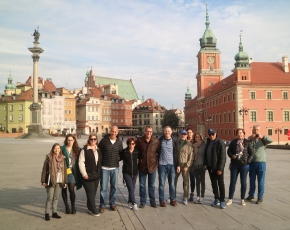
“This isn’t the end – but the beginning of something…” said one the participants of Forum’s most recent Study Trip to Poland chaired by Friends of the Forum, David Lefkowitz and Julie Persily. Given our commitment to continued dialogue, we very much support this sentiment.
This trip to Poland was a chance for Jewish visitors from the US and Israel to learn about modern Poland and Polish/Jewish dialogue, but most importantly to meet School of Dialogue students and Leaders of Dialogue who discover, preserve, document, and share knowledge about Jewish heritage in Poland and cultivate the memory of Jewish communities once populating their towns and villages.
This time, we visited a School of Dialogue in Garwolin, where the students took us on a walking tour of their town’s Jewish past.
In Krakow, the group met with Karolina Panz, Holocaust researcher and Leader from Nowy Targ. We finish the program with a tour of Jewish Dębica guided by the local Leader, Ireneusz Socha, followed by a Shabbat dinner featuring also two other Leaders of Dialogue, Tadeusz Królczyk from Ochotnica Górna and Jolanta Świerczek-Stelmach from Dąbrowa Tarnowska.
The tight schedule of the visit included also meetings with experts on Jewish history and modern Poland, in-depth site visits to the POLIN Museum and Auschwitz Birkenau Memorial and Museum, as well as tours of Jewish sites in Warsaw and Krakow.
Photos: M.Liquornik, A.Steinitz, M.Piekarska
Marcin Dziurdzik October 23rd, 2018
Posted In: EN News 2018
Leave a Comment

Thanks to the efforts of Marek Kołcon, a Leader of Dialogue from Zamość, on October 16th Zamość commemorated the 76th Anniversary of the Annihilation of Zamość Jews. Guests gathered at the train station from which ghetto residents were deported to extermination camps in Bełżec and Sobibór took part in the unveiling of Polish, Hebrew, and English plaques commemorating those tragic events. The ceremony was well-attended by Zamość’s residents and its importance was recognized by representatives of Polish and international Jewish community, with the presence of Michael Schudrich, the Chief Rabbi of Poland, and Izrael Schek, the chairman of the Organization of Jews of Zamosc and Vicinity. The unveiling of the plaques was preceded with an academic panel featuring Alina Skibińska and Dariusz Libionka from Polish Center for Holocaust Research and Adam Kopciowski from Department of Jewish Culture and History at the Maria Curie-Sklodowska University in Lublin.
This moving ceremony is not only a testimony of Marek Kołcon’s tireless work and continuous involvement in saving and preservation of his town’s Jewish memory – his activism dates back to 2003 – but of the international cooperation and dialogue as well: funding for the plaques was obtained not only from institutional donors, but through the joint effort of German, Jewish, and Polish private patrons as well.
Marcin Dziurdzik October 18th, 2018
Posted In: EN News 2018
Leave a Comment
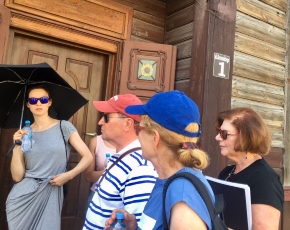
In August, Forum helped organize a meeting between Heidi Urich, and Douglas and Janine Cohen, and the School of Dialogue students from Sierpc. The visit begun with a heart-warming reception by the students accompanied by teachers and representatives of local authorities, including the Mayor. All three visitors received a set of materials containing a detailed map of pre-war Sierpc and documents concerning their families’ history. After a brief meet and greet, the students took the visitors on a tour of Sierpc Jewish sites they have developed as part of the School of Dialogue program. The tour included a stop at the Abraham Neumann’s house. He was a painter, who studied under the tutelage of Jacek Malczewski, one of the most revered painters of Poland. Then they stopped at the Sierpc rabbi’s house, the place where the synagogue used to be, walked around the former ghetto area, and finally paid their respects at the Jewish cemetery. Given that this was not the visitors’ first visit to the town, the route was not a surprise to them. What they truly appreciated, however, was to witness the expertise and knowledge the students had about the Jews of Sierpc. The students surprised the guests with new information, while the guests shared personal family stories that complimented the students’ tale. The visit and the warm welcome have created an atmosphere of dialogue that enabled a deeper mutual understanding of the history of Jews in Sierpc and ensured that the memory of this community will not be lost.
Marcin Dziurdzik September 11th, 2018
Posted In: EN News 2018
Leave a Comment
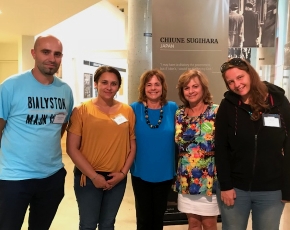
Mariusz Sokołowski, a Leader of Dialogue from Wasilków and Białystok, participated in the Powell Holocaust Summer Institute (from August 6th-10th, 2017) at the Holocaust Center for Humanity in Seattle. This is the second time the experience of Polish educators was part of this incredible program. The Summer Institute consists of a variety of lectures, workshops, discussions and site visits, including, among others, an inspiring conversation with Alexandra Zapruder, author of “Salvaged Pages”, about using children’s diaries in the classroom, as well as a lecture by Beth Griech-Pollele about German Catholic Church’s attitudes during the Nazi era. Another highlight of the program was the site visit to Bainbridge Island Japanese American Exclusion Memorial, an outdoor exhibit commemorating the internment of Japanese Americans during World War II.
But the part of the program that Mariusz found most inspirational was the meeting with Henry Friedman, Holocaust Survivor, and Steven Baral, whose parents survived the Holocaust by being on the Schindler’s List. For his part, Mariusz had an opportunity to share his perspective and experiences of using the School of Dialogue as means of introducing local Jewish history into his teaching of history, and ways in which he continues to incorporate the rich legacy of Wasilków Jews into his educational practices.
Mariusz Sokołowski’s participation in Powell Holocaust Summer Institute was made possible by the generous support of Nancy Powell and Carol Heller.
Marcin Dziurdzik August 28th, 2018
Posted In: EN News 2018
Leave a Comment
Next Page »
